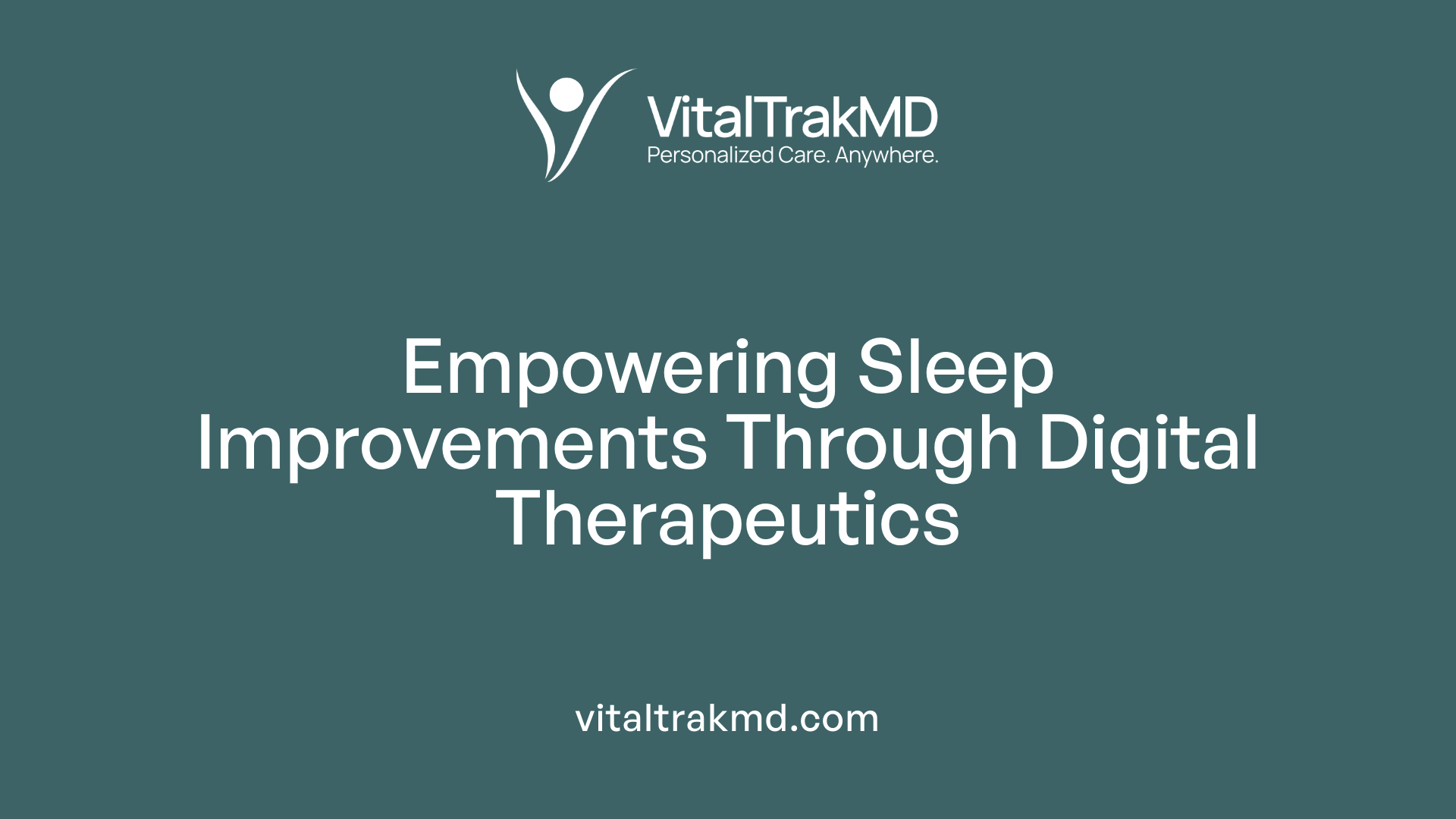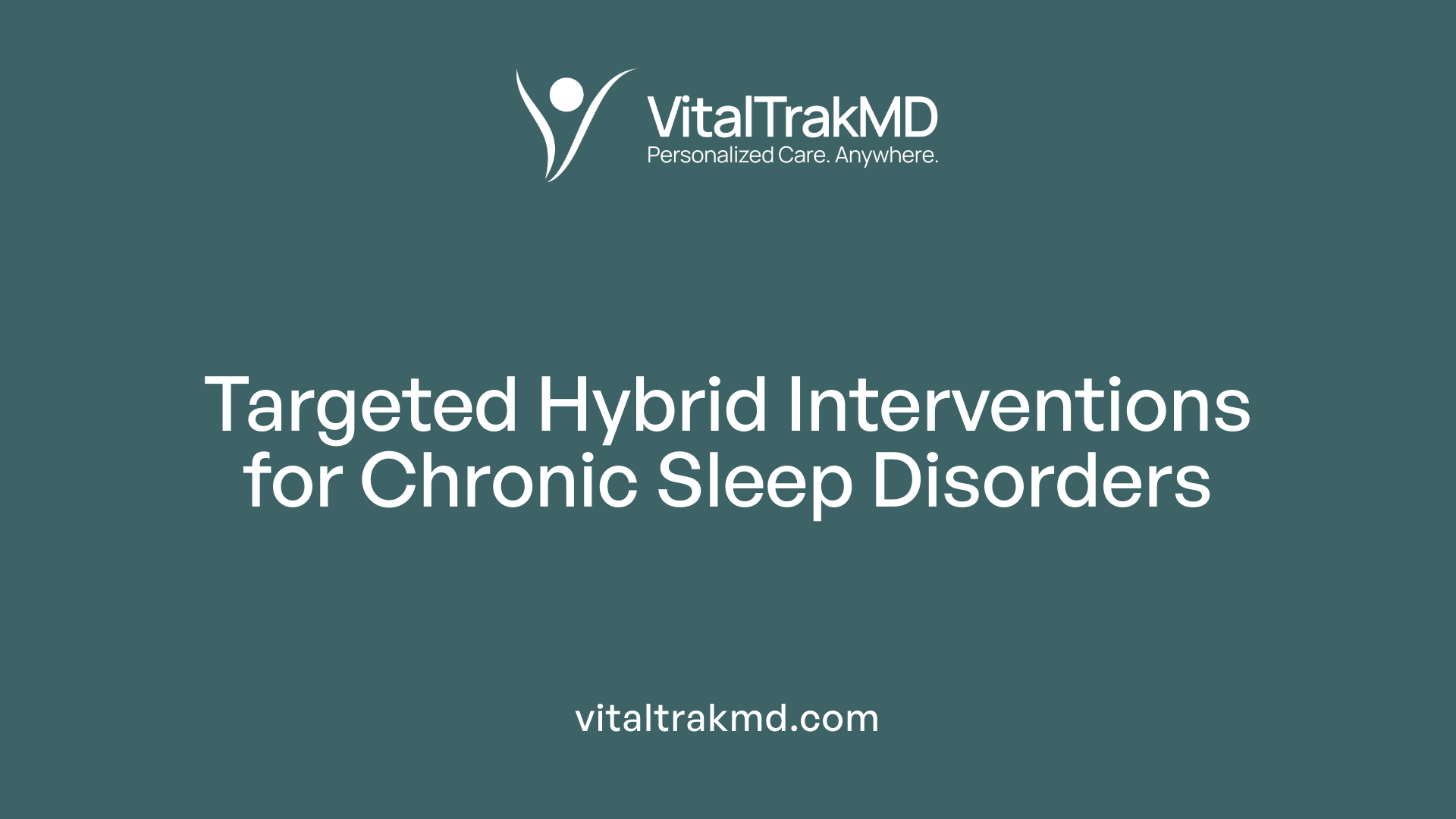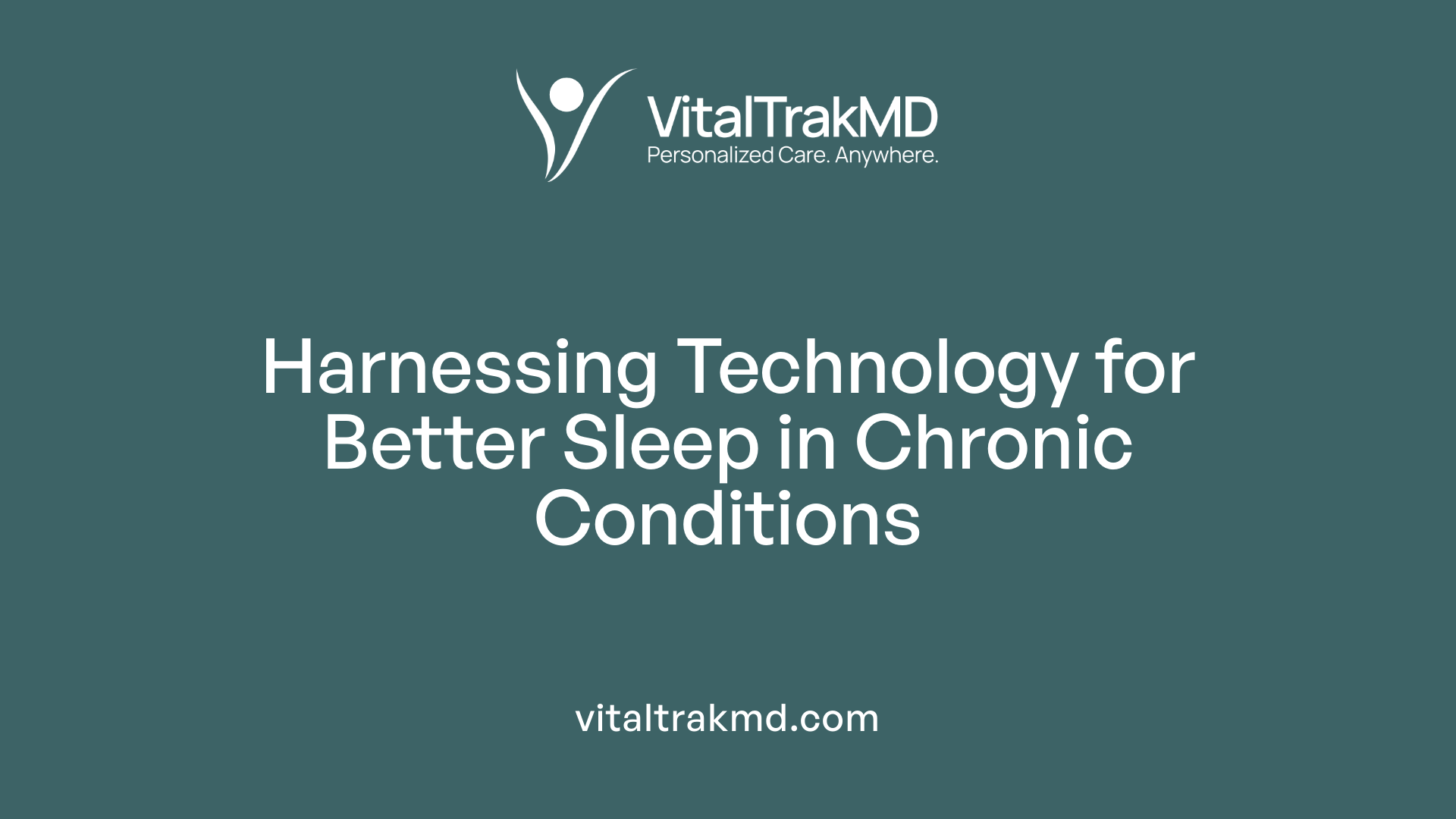The Role of Hybrid Care in Enhancing Sleep Quality for Adults

Understanding Hybrid Care's Potential in Adult Sleep Improvement
In recent years, hybrid care models integrating innovative technologies and personalized strategies have shown promising potential in improving sleep quality among adults. By blending traditional clinical approaches with digital tools, these models aim to address the multifaceted nature of sleep disturbances, especially in populations with chronic health conditions. This article explores how hybrid care approaches enhance sleep health, supported by evolving evidence and practical applications.
Overview of Hybrid Care in Sleep Management
What is hybrid care in sleep health?
Hybrid care refers to a comprehensive approach that combines traditional healthcare practices with innovative digital tools and technology-based solutions. In sleep management, this approach integrates evidence-based therapies with user-friendly digital platforms, real-time monitoring, and personalized interventions to optimize sleep outcomes.
Definitions and components of hybrid care
Hybrid sleep care typically includes several key elements:
- Clinical assessments and personalized plans: Developed by healthcare professionals based on individual sleep patterns and health conditions.
- Digital therapeutics: Such as digital cognitive-behavioral therapy for insomnia (dCBT-I), delivered through apps like Sleepio.
- Wearable and monitoring devices: Use of actigraphy or other sensors to track sleep and daytime activity, providing real-time data.
- Educational resources: Information about sleep hygiene, physical activity, and managing conditions affecting sleep.
- Support and coaching: Regular contact with trained coaches or clinicians to motivate, support, and adjust interventions as needed.
Key features of hybrid sleep interventions
Hybrid solutions are designed to be scalable, adaptable, and personalized.
- They leverage technology to deliver interventions remotely, reducing barriers like geographic location or mobility issues.
- Support structures, including motivational language and accountability methods, encourage sustained engagement.
- Interventions are tailored to individual preferences, lifestyles, and health conditions, making them more effective.
- Continuous monitoring allows for dynamic adjustments, optimizing therapy based on real-time feedback.
Scope of hybrid solutions for adult sleep health
These approaches are applicable across a broad spectrum of adult populations, including those with sleep disturbances linked to chronic diseases like osteoarthritis and diabetes.
- In osteoarthritis, hybrid care can incorporate physical activity promotion and sleep hygiene education, supported by digital tools to enhance adherence.
- For individuals with diabetes, hybrid systems like advanced hybrid closed-loop insulin delivery can improve nocturnal glycemic control, indirectly benefiting sleep.
- The adaptability of hybrid systems allows healthcare providers to address multifaceted causes of sleep problems, ensuring a personalized, sustainable, and effective management plan.
| Aspect | Description | Implementation Examples |
|---|---|---|
| Personalization | Tailored interventions based on user data | Adjusting sleep schedules via app alerts |
| Support | Ongoing coaching and feedback | Regular virtual check-ins with health coaches |
| Technology | Use of digital tools and devices | Wearable sleep sensors and digital CBT programs |
| Scalability | Capacity to reach large populations | Digital platforms accessible nationwide |
| Adaptability | Customization for individual needs | Modifying activity plans for physical ability |
Hybrid sleep care bridges the gap between traditional treatments and modern technology, offering a promising route to better sleep health for adults.
Digital Therapies and Support Systems
 Digital health platforms play a pivotal role in modern sleep management, especially for individuals with chronic conditions such as osteoarthritis and diabetes. One prominent approach is digital cognitive-behavioral therapy for insomnia (dCBT-I), which offers a scalable, accessible, and evidence-based solution for improving sleep. An example of this is Sleepio, a widely used online program that guides users through proven sleep improvement techniques using interactive modules.
Digital health platforms play a pivotal role in modern sleep management, especially for individuals with chronic conditions such as osteoarthritis and diabetes. One prominent approach is digital cognitive-behavioral therapy for insomnia (dCBT-I), which offers a scalable, accessible, and evidence-based solution for improving sleep. An example of this is Sleepio, a widely used online program that guides users through proven sleep improvement techniques using interactive modules.
The implementation of patient-facing apps and platforms, such as COAST, further enhances personalized care. COAST integrates a clinician portal with a patient app, employing algorithms to identify sleep-disordered patterns and support clinical decision-making. These platforms tailor interventions based on individual needs, providing continuous support and guidance.
Evidence supporting hybrid care models—combining digital therapies with in-person or remote coaching—is strong. Research indicates that this approach increases treatment adherence, engagement, and outcomes. Tailoring strategies, accountability through regular contact with healthcare professionals, and educational components contribute to sustained behavior change.
Moreover, digital therapeutic approaches are cost-effective and resource-sensitive, allowing wider dissemination in various healthcare settings, including military and veteran facilities. They facilitate early intervention, reduce the burden on traditional healthcare services, and adapt to individual progress and challenges.
In summary, digital platforms like Sleepio and COAST exemplify how technology-based interventions support effective, scalable, and personalized sleep therapies. Incorporating these tools into routine care can significantly improve sleep quality and overall health outcomes.
Integrated Systems Supporting Personalized Sleep Care

What are clinician portals and patient apps?
In modern sleep care, digital platforms like clinician portals and patient applications are critical tools. The COAST system exemplifies this approach by providing a clinician portal combined with a patient app. The clinician portal allows healthcare providers to view sleep data collected through algorithms that detect patterns of disordered sleep. This empowers them to make informed decisions and tailor interventions for each patient.
The patient app offers a user-friendly interface for individuals to engage with their sleep health actively. It supports recording sleep, providing educational content, and delivering personalized feedback. This digital connection enhances communication and ensures that users have continuous support, improving adherence and satisfaction.
How do algorithms support detection of sleep issues?
At the heart of these digital tools are sophisticated algorithms capable of analyzing large data sets collected from wearable devices and sleep trackers. These algorithms identify signs of sleep disturbances, such as irregular sleep patterns or fragmentation.
For example, in the COAST model, the system detects sleep-disordered patterns and segments the data for clinical review. This automation speeds up diagnosis, reduces subjective bias, and enables treatments that are more precisely aligned with an individual's specific sleep issues.
How is personalization of sleep interventions achieved?
Personalized sleep interventions are central to enhancing treatment effectiveness. The systems support customization by considering individual sleep patterns, health status, and preferences. For example, digital cognitive behavioral therapy for insomnia (dCBT-I), like Sleepio, is integrated into the platform to provide tailored behavioral recommendations.
Furthermore, algorithms help adapt recommendations based on ongoing data, ensuring that interventions remain relevant and effective. The goal is to support sustainable behavioral change, incorporating motivational language, educational resources, and social support. Regular contact with coaches, who provide empathetic, personalized guidance, reinforces this tailored approach.
Impact of hybrid healthcare models and technologies on sleep health
These combined models—blending in-person care with digital health tools—have shown great promise in improving sleep health. They enhance accessibility, especially for populations with barriers to traditional care, such as remote or underserved communities.
Advanced technologies like hybrid closed-loop systems in youth with Type 1 Diabetes demonstrate how automation can stabilize blood glucose levels during sleep, reduce hypoglycemia fears, and improve overall sleep quality. Digital CBT-I delivered via telehealth removes geographical and logistical barriers, making evidence-based insomnia treatment more widely available.
Overall, these hybrid approaches facilitate highly personalized, efficient, and scalable care strategies. They allow for continuous monitoring and adjustment, leading to better adherence and more meaningful outcomes. When combined, digital tools and hybrid healthcare models are transforming sleep management—making it more accessible, effective, and tailored to individual needs, across varied populations and conditions.
Targeted Interventions for Chronic Conditions

How are hybrid care strategies applied in behavioral, clinical, and technological sleep interventions?
Hybrid care strategies in sleep interventions blend behavioral, clinical, and technological methods to improve treatment reach and effectiveness. Digital tools like internet-based cognitive-behavioral therapy for insomnia (CBTi), mobile applications, and wearable devices help monitor symptoms and deliver personalized, scalable interventions.
These digital solutions often work alongside traditional behavioral techniques such as sleep restriction, stimulus control, and cognitive restructuring. Interventions may be delivered through online platforms or group settings, providing flexibility and accessibility.
Support from clinicians or digital navigators is essential to keep users engaged and adapt treatments to individual needs. For complex cases involving mental health issues, this human support helps optimize outcomes.
Models like stepped care leverage digital, group, and personal therapies together, reducing wait times and making treatment more efficient and resource-sensitive.
What is the significance of advanced technologies, such as hybrid closed-loop systems, in enhancing sleep quality?
Advanced technologies, especially hybrid closed-loop (HCL) systems, significantly impact sleep quality for people with type 1 diabetes. These systems automatically adjust insulin delivery based on real-time glucose monitoring, helping to stabilize blood sugar levels overnight.
Studies show HCL systems improve nocturnal glycemic control, lower hypoglycemia risks, and reduce blood glucose variability—all factors that support better sleep. Though objective sleep improvements within short follow-up periods are modest, caregivers and adolescents often report reduced anxiety about hypoglycemia and enhanced overall quality of life.
As technology progresses, with developments toward fully automated artificial pancreas systems and more accurate sensors, the potential to further improve sleep quality increases. These brain-and-body-friendly systems not only boost diabetes management but also help minimize sleep disturbances linked to blood sugar fluctuations.
| Technology | Benefits | Additional Considerations |
|---|---|---|
| Hybrid closed-loop systems | Improve overnight glycemic control, reduce hypoglycemia | Long-term studies needed to assess sustained sleep benefits |
| Fully automated artificial pancreas | Potential for greater blood sugar stability | Sensor accuracy and alarm management challenges |
Overall, these innovations in diabetes technology support both physical health and sleep health by reducing the risks related to blood sugar issues at night.
Sleep and Technology in Special Populations

How does advanced technology improve sleep in people with diabetes?
Advanced diabetes management systems, like hybrid closed-loop (HCL) insulin delivery, have shown promise in improving sleep for individuals with type 1 diabetes. These systems automatically regulate insulin doses based on continuous glucose monitoring, which helps reduce nocturnal hypoglycemia and glucose variability. This stability is crucial because frequent nighttime dips in blood sugar can cause awakenings or discomfort.
Although direct measures of sleep quality, such as actigraphy assessments, have not documented significant improvements over short periods like three months, caregivers and adolescents report feeling less worried about overnight hypoglycemia. This emotional relief can translate into better perceived sleep quality and reduced sleep-related anxiety. Furthermore, improved glycemic control overnight may help decrease the fear of sudden hypoglycemic events, a major sleep disruptor for many families.
As technology continues to evolve—particularly with the development of fully automated artificial pancreas systems and sensors with higher accuracy—the potential for further sleep enhancements increases. These innovations may lead to more consistent blood glucose levels and fewer alarms or disruptions during sleep.
In summary, while current evidence suggests that hybrid closed-loop devices primarily improve metabolic stability, their indirect benefits—such as reduced anxiety, fear of hypoglycemia, and overall quality of life—are important contributors to better sleep health in individuals with type 1 diabetes.
How do these technological advances support sleep in youth with T1D?
A study involving youth with T1D found that initiation of hybrid closed-loop systems improved adolescents' sleep efficiency and decreased parental wakefulness after sleep onset. Additionally, parents reported feeling more satisfied with their child's sleep and experienced less worry about nighttime glycemia.
These improvements are significant because they reduce the constant vigilance needed by parents to monitor blood glucose levels, which often interferes with their own sleep patterns. The technology’s ability to stabilize nocturnal blood sugar levels thereby supports both the physical rest and mental well-being of the entire family.
What about veterans experiencing insomnia?
While the primary focus here is on diabetes, it’s important to recognize that veterans often face high rates of chronic insomnia—up to 75% in some samples—and face barriers to effective treatment. Innovations like digital cognitive behavioral therapy for insomnia (dCBT-I) are promising, offering scalable, personalized approaches to managing sleep problems. Such digital tools, including platforms like Sleepio, provide tailored education and motivation, helping veterans overcome barriers like stigma or access issues associated with traditional therapy.
Combining these approaches with emerging technology solutions may enhance sleep health outcomes for veterans and other populations with complex health needs.
| Technology Type | Benefits | Limitations | Future Directions |
|---|---|---|---|
| Hybrid Closed-Loop Systems | Reduce hypoglycemia, improve glucose stability | Limited direct evidence of sleep improvements | Fully automated systems, sensor upgrades |
| Digital CBT for Insomnia (dCBT-I) | Scalable, personalized treatment, accessible | Engagement varies, may need support to optimize adherence | Integration with wearable tech |
| Emerging Artificial Pancreas Systems | Potential for better glucose control, indirect sleep benefits | Technical challenges like sensor accuracy and alarms | Enhanced sensors, smarter algorithms |
By leveraging technological advancements, healthcare providers can better address sleep disturbances in populations with chronic health conditions. For individuals with T1D or veterans with insomnia, these innovations offer hope for safer, more restful nights.
Implementing Hybrid Care: Challenges and Strategies
What are the barriers to implementing hybrid sleep care interventions, and how can they be overcome?
Implementing hybrid sleep care interventions, especially for adults with osteoarthritis or other chronic conditions, faces several obstacles. Common barriers include technical uncertainties such as unfamiliarity with digital platforms or unreliable device functioning. Participants may also experience recording burdens, where daily logs or app entries become tedious and discourage consistent use.
Limited interaction with healthcare professionals can hinder engagement, as users often desire empathetic support and clear communication. Lack of awareness around digital tools' availability and benefits further restricts adoption among target populations.
To address these barriers, strategies rooted in user-centered design are essential. Tailoring communication and support to individual needs enhances relevance and motivation. Providing structured coaching with motivational language and accountability mechanisms, like progress reporting, can sustain user engagement.
Education plays a critical role—informing users about the benefits of sleep and physical activity improvements and how digital tools can facilitate these goals fosters trust and enthusiasm. Addressing technical issues proactively, through user-friendly interfaces and responsive support, minimizes frustration.
Stakeholder feedback, obtained via qualitative assessments such as focus groups, guides iterative development. Listening to preferences about interaction style, technical features, and content ensures interventions are acceptable and accessible.
Further, integrating social support options, whether through peer groups or healthcare professional interaction, supports long-term adherence. Training clinicians and support staff in empathetic communication and technical support enhances overall implementation.
Ultimately, combining these strategies promotes smoother adoption, greater sustainability, and improved health outcomes for individuals utilizing hybrid sleep and health interventions.
Future Directions in Hybrid Sleep Care

What is the significance of advanced technologies, such as hybrid closed-loop systems, in enhancing sleep quality?
Innovations like hybrid closed-loop (HCL) systems are transforming how sleep-related issues are managed, especially for individuals living with type 1 diabetes. These systems automatically adjust insulin delivery based on continuous glucose monitoring, helping to reduce nocturnal hypoglycemia and glucose variability. Such improvements in blood sugar stability are important because they lower the risk of sleep disruptions caused by hypoglycemia and the anxiety associated with Blood sugar fluctuations.
While initial studies indicate that HCL systems significantly improve nocturnal glycemic control, the impact on actual sleep duration and quality measured objectively has been less clear in early research, typically within a three-month period. Despite this, many users and caregivers report feeling less worried about nighttime hypoglycemia, leading to enhanced sleep quality and decreased sleep-related anxiety.
With ongoing technological progress, including the development of fully automated artificial pancreas systems, the potential to further improve sleep becomes even greater. These advanced systems are expected to offer more precise insulin delivery, reduce alarms and sensor inaccuracies, and further diminish glycemic variability—factors that could translate into more consistent, restful sleep for users.
Beyond glycemic control, these innovations also promote psychological well-being by alleviating fears related to hypoglycemia during sleep. Overall, such tools not only support more effective diabetes management but also contribute significantly to better sleep health and overall quality of life.
As research continues and technology evolves, the integration of these advanced systems into routine diabetes care is likely to become more widespread, offering tailored solutions that address individual sleep needs and health goals. This progress signifies a promising future where managing chronic conditions can go hand-in-hand with improving rest and daily functioning.
Summary and Implications for Practice
Key takeaways from research
Recent studies underscore the potential of digital health interventions in managing sleep issues and related conditions. For adults with osteoarthritis (OA), personalized, supported programs that combine sleep and physical activity support show promise. Participants preferred tailored, sustainable approaches involving empathetic coaching, motivational language, and social support. The use of digital platforms, like the COAST system, demonstrates the feasibility and effectiveness of scalable, adaptable therapies such as digital cognitive behavioral therapy for insomnia (dCBT-I). Additionally, advanced technologies in diabetes management, such as hybrid closed-loop insulin systems, have improved sleep quality by reducing blood glucose fluctuations and hypoglycemia risks.
For veterans and youth with type 1 diabetes (T1D), implementing hybrid closed-loop systems has shown improvements in sleep duration, efficiency, and glycemic control, which alleviates parental anxiety and enhances quality of life.
Overall, innovative technological solutions are proving to be acceptable, feasible, and beneficial in improving sleep and health outcomes across various populations.
Implications for healthcare providers and patients
Healthcare providers should consider integrating digital therapies, such as dCBT-I and personalized physical activity plans, into routine care for patients with sleep disturbances and chronic conditions like OA and T1D.
Educating patients about these options can improve engagement and adherence. Empathetic communication, addressing individual barriers, and offering social support are essential components.
Patients benefit from approaches that are personalized, easy to follow, and supported by regular contact with coaches or healthcare professionals. Emphasizing behavioral, rather than solely pharmacological, options can lead to more sustainable long-term outcomes.
The promising results from technology-driven treatments suggest that broader adoption could enhance access, especially for populations with barriers to traditional therapy.
Directions for future research
Future studies should focus on refining digital sleep interventions to maximize engagement and effectiveness across diverse populations. Research exploring the long-term sustainability of these digital therapies is also needed.
Further investigation into the integration of advanced health technologies, such as artificial pancreas systems and hybrid closed-loop insulin delivery, will help determine their broader impact on sleep and disease management.
Additionally, exploring barriers to adoption and ways to improve user experience will be crucial for wider dissemination. Ongoing studies should also evaluate cost-effectiveness and scalability, aiming to embed these innovations in routine clinical practice.
Harnessing Hybrid Care for Sleep Optimization
Hybrid care represents a transformative approach to improving sleep quality among adults by integrating innovative digital tools, personalized behavioral strategies, and advanced clinical interventions. As evidence accumulates, particularly around technologies like digital CBT for insomnia, personalized physical activity programs, and hybrid closed-loop systems in diabetes management, healthcare providers are better equipped to deliver effective, scalable, and patient-centered care. Future developments in automation, sensor technology, and stakeholder engagement are poised to further enhance these outcomes. Embracing hybrid care models is essential for advancing sleep health and addressing the complex needs of diverse adult populations.
References
- Development of a hybrid sleep and physical activity ...
- Enhancing behavioral sleep care with digital technology
- An Unanticipated Benefit of Hybrid Closed-Loop Insulin ...
- A hybrid type I trial to increase Veterans' access to insomnia ...
- Is CBD a Safe and Effective Sleep Aid?
- Development of a hybrid sleep and physical activity ...
- Impact of 6-months of an advanced hybrid closed-loop ...
- Somnology Launches Hybrid Sleep Care in Collaboration ...
Recent articles
Want to Feel Better and Live Healthier?
Join hundreds of patients taking control of their health with personalized care that fits their life – not the other way around.
Rated 4.8/5 by 32+ customers







